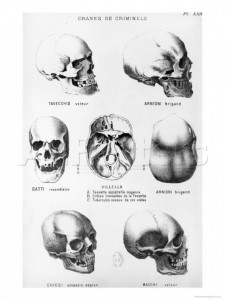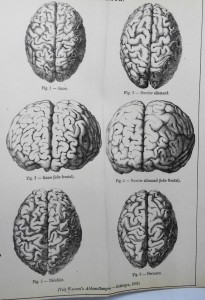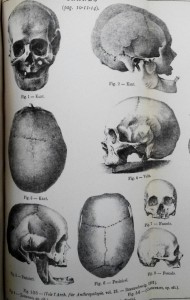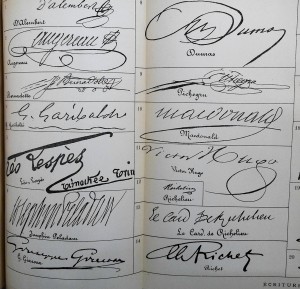This post is part of an ongoing series featuring items recently cataloged from the Julio Mario Santo Domingo Collection.
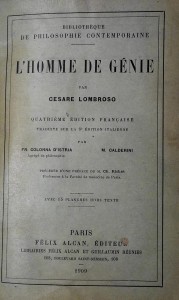 Cesare Lombroso was an Italian physician and criminologist who founded the Italian School of Positivist Criminology. Lombroso’s theory of anthropological criminology was a mix of the concepts of Social Darwinism, physiognomy, psychiatry, and degeneration theory. Essentially he believed that people inherited criminal behavior and that these “born criminals” could be identified by specific physical anomalies. For example he thought that a sloping forehead, ears of unusual size, asymmetry of the face, excessive length of arms, and asymmetry of the cranium signaled a return to a more primitive man reminiscent of the apes who couldn’t grasp the expectations and rules of modern society, which led them to criminal behavior.
Cesare Lombroso was an Italian physician and criminologist who founded the Italian School of Positivist Criminology. Lombroso’s theory of anthropological criminology was a mix of the concepts of Social Darwinism, physiognomy, psychiatry, and degeneration theory. Essentially he believed that people inherited criminal behavior and that these “born criminals” could be identified by specific physical anomalies. For example he thought that a sloping forehead, ears of unusual size, asymmetry of the face, excessive length of arms, and asymmetry of the cranium signaled a return to a more primitive man reminiscent of the apes who couldn’t grasp the expectations and rules of modern society, which led them to criminal behavior.
He reached these conclusions from years of doing postmortem exams and anthropometric studies on a combination of criminals, the insane, and “normal” individuals. Lombroso thought that specific types of criminals such as murderers, rapists, and thieves could each be identified by a specific characteristic. His research methods were very clinically descriptive, but not a great deal of statistical comparisons of criminals versus non-criminals or any social effects on criminal behavior.
Lombroso published L’uomo di genio in 1899 in his native Italian and our French translated version of L’homme de genie is from 1909. Translated into English both titles are known as The Man of Genius. In the volume Lombroso states that artistic genius was essentially a form of hereditary insanity. These fold-out plates that are at the end of the text explore the size and shape of skulls and brains, as well as signatures of these “men of genius. ”
This volume can be found in Widener’s collection.
L’homme de genie / par Cesare Lombroso ; traduite sur la VIme ed. italienne par Fr. Colonna D’Istria agrege de philosophie et M. Calderini et precedee d’une preface de Mr. Ch. Richet Professeur a la faculte de Medecine de Paris. Paris : Felix Alcan, 1909.
Thanks to Alison Harris, Santo Domingo Project Manager, for contributing this post.

